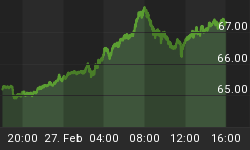Willem Buiter, Citigroup's Chief Economist, spoke with Bloomberg Television's Tom Keene today about the crisis in Europe.
Buiter said that "time is running out fast" and that "it could be weeks, it could be days, before there is a material risk of a fundamentally unnecessary default by a country like Spain or Italy which would be a financial catastrophe dragging down the European banking system and North America with it."
Buiter on Europe's crisis:
"Time is running out fast. I think we have maybe a few months -- it could be weeks, it could be days -- before there is a material risk of a fundamentally unnecessary default by a country like Spain or Italy which would be a financial catastrophe dragging the European banking system and North America with it. So they have to act now."
"The only two guns in town, one is only theoretical, and that is increasing the size of the EFSF to 3 trillion. It should happen but it can't for political reasons. The other one, the only remaining share is the ECB. They may have to hold their noses while they do it, and if they don't do it, it's the end of the euro zone."
On why the ECB hasn't acted yet:
"Because after the error of the Bundesbank, they consider central banks purchasing sovereign debt outright to be like swearing in church. It's just not done. This has been in fact to a certain extent embedded in the treaty which forbids the ECB from lending directly to governments or buying stuff in the primary market. But there is no restriction at all on them buying any amount of sovereign debt at any time in the secondary market, so they can do it."
"This crisis is the result of the failure to provide the minimal institutional underpinning for a monetary union in the euro area and also a result of the ECB unfortunately being the heir of the Bundesbank and therefore not understanding and rejecting the role of central bank as lenders' last resort to sovereigns. They certainly are a central bank. They just are a central bank that prefers to fight with both hands behind their back. If they just let go of one hand, that would be enough."
On Italy's situation:
"This is already challenging. If this was the rate at which they are going to fund themselves, even over the medium term, that becomes an explosive debt deficit spiral...This is clearly unsustainable. You can live here for awhile, they're not going to keel over tomorrow, but this is not sustainable...The only way they can get back there is for the ECB to provide the liquidity while Italy does the hard work for years, in fact for the rest of the decade quite possibly, of restructuring their economy and tightening the budget in a major way."
On whether he's concerned about France:
I think France definitely has its work cut out for itself. It has a government budgeting problem which is structural to a large extent. And then they have a large banking sector. Do not forget that the U.S. banking sector balance sheet is less than 100% of GDP. In Europe and France, it is 300%. Their banks are under fire and so their sovereigns are under fire. I do not think the sovereign will keel over, but they have their work cut out for them.
On what he'd like to see in Europe to get the fiscal house in order:
Clearly some minimal federal fiscal structure would be desirable, but it is completely unrealistic. They best they can hope for is that the ECB will indeed ring fence the euro area sovereigns in exchange for basically glorified IMF programs. So that they will temporarily transfer a significant amount of fiscal sovereignty to some super-national body, but then when they get restored to health, they regain this. That is not a long-term solution. Ultimately there will have to be some form of fiscal union that creates a federal solution, but that's for the next crisis, not this one.
On whether Europe is an AIG waiting to happen:
No for several reasons. First of all, AIG happened and everybody learned from it. Whereas the sovereign CDS, the regulators by and large know who wrote it, who issued it and who holds it. Unlike quite a bit of the CDS written by AIG. This stuff is all collateralized. So nothing is ever completely safe, even sovereign debt, but I think it's a lot safer to trigger them and use their insurance value than to kill the market."
On the quality of the German economy right now:
"It is a mixed bag. It has a very productive manufacturing exporting sector. Much of the rest of it is not very efficient at all, including the services sectors. Germany had the world's largest corporate takeover in 1999 when West Germany took on East Germany. That has not been fully digested yet. It is a country that is very much a dual economy. It is very strong at the moment strong at the moment as an export-oriented economy, which of course is vulnerable to cyclical slowdowns...it is structural and cyclical. The German demographics are terrible, even by European standards."
On whether the U.S. should use its currency to help with exports:
"No, I think to pursue competitiveness policies by manipulating or steering down the nominal values of the exchange rate is a loser's game. In the limit, it gets you to Zimbabwe, which didn't exactly become a hub of competiveness. It's a gross misalignment for historical reasons...I think we shouldn't get too upset about the Chinese manipulating their currency. There's also no reason to attach great importance to the ability of the U.S. in manipulating its currency. Both are second order instruments."















